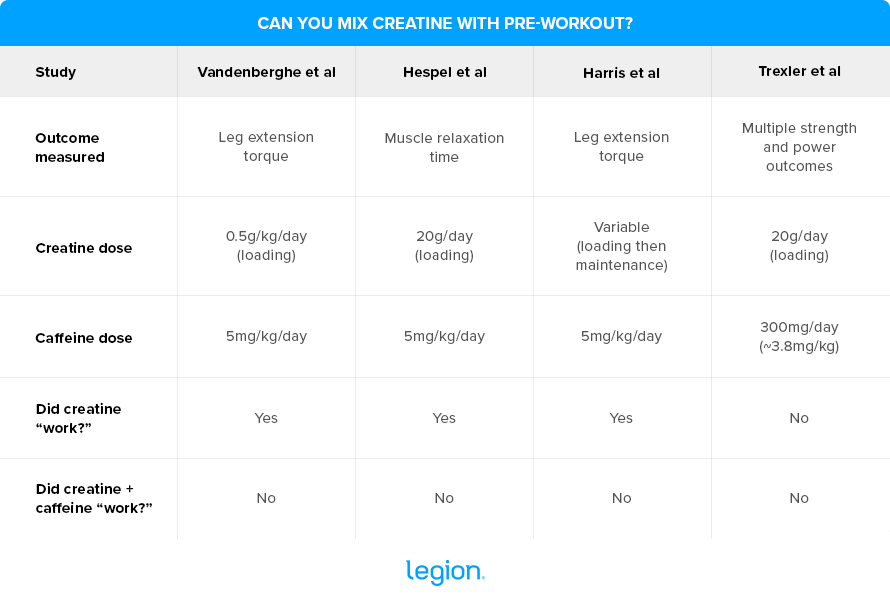If you’re serious about gaining muscle and strength, you probably take creatine and pre-workout.
However, you may have heard that taking these two supplements together is a bad idea since they counteract each other’s performance-enhancing benefits.
Is this true? Can you mix pre-workout with creatine? Or is it counterproductive?
The short and rather unsatisfying answer is it depends—factors such as the ingredients in your pre-workout and whether you’re loading creatine play a part.
In this article, you’ll learn what science says about mixing creatine with pre-workout. You’ll also discover the difference between these supplements, the best time to take creatine, and more.
Creatine vs. Pre-Workout: What’s the Difference?
Creatine and pre-workout are two dietary supplements used to boost athletic performance. Because of this similarity, many people think they’re the same.
In reality, however, creatine and pre-workout are quite different.
Creatine
Creatine is a naturally occurring compound composed of the amino acids L-arginine, glycine, and methionine.
Your kidneys and liver produce creatine, and you can also absorb it from foods like red meat, fish, and eggs. Your body stores this creatine in your muscles, where it helps generate adenosine triphosphate (ATP), the primary source of cellular energy.
Creatine supplements, such as creatine powder and creatine gummies, are popular among athletes and gymgoers because they have numerous muscle-building and performance-enhancing benefits.
Specifically, they boost strength and power, accelerate muscle growth, improve endurance, enhance recovery, and more.
Pre-Workout
A pre-workout supplement, or “pre-workout” for short, is a sports nutrition supplement taken before training to enhance energy levels and focus.
Pre-workout usually contains a mix of ingredients, such as caffeine, theanine, citrulline malate, and beta-alanine.
Can You Mix Creatine With Pre-Workout?
Whether you can mix creatine with pre-workout largely depends on one thing: caffeine.
If your pre-workout is caffeine-free, there’s likely no downside to combining it with creatine.
But if your pre-workout contains caffeine, things get more complicated.
On the surface, combining creatine and pre-workout containing caffeine seems like a no-brainer: creatine boosts strength, power, and endurance, while caffeine enhances focus and energy.
And since they work in different ways—creatine increases ATP production, while caffeine stimulates the central nervous system—you’d expect them to complement each other perfectly.
But research shows that’s not always the case.
Four high–quality studies have looked at the effects of mixing creatine with caffeine during a creatine “loading phase” (a period when you take a large daily dose of creatine to help it accumulate in your muscle faster).
Here’s a summary of their results:

Surprisingly, while three studies showed that creatine alone boosted performance, none reported positive effects when people combined creatine with caffeine.
Scientists are still unsure why this is, but there are two leading theories:
- Creatine helps muscles relax faster, which enables you to generate high amounts of force quickly and repeatedly. Conversely, caffeine slows this process, which may negate creatine’s benefits.
- Taking large doses of both supplements can cause gastrointestinal issues that make it hard to perform at your best.
While these results are interesting, we can’t necessarily apply them to people taking smaller doses of caffeine and creatine, especially since research also shows that using caffeine immediately after a creatine loading phase has a positive impact on athletic performance.
Moreover, studies have shown that pre-workout supplements containing caffeine and creatine can improve exercise performance and muscle growth.
However, the supplements in these studies also included other performance-boosting and muscle-building ingredients, such as beta-alanine and whey protein, making it unclear what produced the benefits—the creatine, caffeine, or the combination of all the ingredients.
A 2022 study published in the Journal of Dietary Supplements adds another twist.
It found that weightlifters taking creatine alone gained quad muscle, while those combining it with caffeine did not. However, the difference in muscle growth was small, and the creatine-only group didn’t outperform the placebo in any other measure, including overall muscle gain, strength, or endurance.
Given these results, it’s hard to argue that caffeine definitively interferes with creatine’s benefits. If caffeine truly reduced creatine’s effectiveness, the creatine group should have outperformed the placebo across all metrics—but that wasn’t the case.
Conclusion
The evidence that caffeine blunts creatine’s benefits is weak. If it happens at all, it’s likely only an issue during a creatine loading phase.
Thus, you’re probably safe to mix creatine with pre-workout powder containing caffeine, provided you keep the doses moderate—no more than 350 milligrams of caffeine and 5 grams of creatine.
This should be enough to experience a performance boost without any stomach discomfort that might hinder your training.
Should You Take Creatine Before or After Your Workout?
There’s no benefit to taking creatine right before you train. Unlike caffeine, creatine doesn’t give you an immediate energy boost or sharpen your focus. Instead, it works by building up in your muscles over time.
Therefore, a prudent approach is to take pre-workout and creatine separately. For example, take your pre-workout 30-to-60 minutes before training, then take your creatine with your post-workout meal or protein shake.
This way, you maximize the benefits of both supplements without any potential interference.
Or, if that doesn’t fit your schedule, take creatine at any time that works for you—just avoid combining it with hefty doses of caffeine.
FAQ #1: Is creatine the same as pre-workout?
No, creatine and pre-workout aren’t the same.
Creatine is a single ingredient that helps increase strength, power, and muscle growth by boosting your body’s ATP production.
Pre-workout supplements, on the other hand, are blends of multiple ingredients like caffeine, beta-alanine, and l-citrulline, designed to enhance focus, energy, endurance, and overall workout performance.
Yes, you can take extra creatine, but it might not be necessary.
Most pre-workout powders contain a small amount of creatine—usually not enough to reach the optimal daily dose of 3-to-5 grams. If your pre-workout has less than this amount, adding extra creatine can help ensure you get all the benefits.
Likewise, if you’re loading creatine or want to take a higher dose, extra creatine may be necessary to hit your target.
FAQ #3: Does creatine give you energy like pre-workout?
Not exactly. Creatine doesn’t provide the same immediate boost in energy and focus that you get from a pre-workout containing stimulants like caffeine.
Instead, creatine helps your muscles produce more energy over time by increasing ATP production, which enhances strength and endurance during high-intensity physical tasks like weightlifting.
Scientific References +
- Cooper, Robert, et al. “Creatine Supplementation with Specific View to Exercise/Sports Performance: An Update.” Journal of the International Society of Sports Nutrition, vol. 9, no. 1, 20 July 2012, pp. 1–11, www.ncbi.nlm.nih.gov/pmc/articles/PMC3407788/, https://doi.org/10.1186/1550-2783-9-33.
- Volek, Jeff S., et al. “The Effects of Creatine Supplementation on Muscular Performance and Body Composition Responses to Short-Term Resistance Training Overreaching.” European Journal of Applied Physiology, vol. 91, no. 5-6, 1 May 2004, pp. 628–637, https://doi.org/10.1007/s00421-003-1031-z.
- Jd, Branch. “Effect of Creatine Supplementation on Body Composition and Performance: A Meta-Analysis.” International Journal of Sport Nutrition and Exercise Metabolism, 1 June 2003, pubmed.ncbi.nlm.nih.gov/12945830/.
- Eckerson, Joan M., et al. “Effect of Creatine Phosphate Supplementation on Anaerobic Working Capacity and Body Weight after Two and Six Days of Loading in Men and Women.” The Journal of Strength and Conditioning Research, vol. 19, no. 4, 2005, p. 756, https://doi.org/10.1519/r-16924.1.
- Vandenberghe, K., et al. “Caffeine Counteracts the Ergogenic Action of Muscle Creatine Loading.” Journal of Applied Physiology, vol. 80, no. 2, 1 Feb. 1996, pp. 452–457, https://doi.org/10.1152/jappl.1996.80.2.452.
- Hespel, P., et al. “Opposite Actions of Caffeine and Creatine on Muscle Relaxation Time in Humans.” Journal of Applied Physiology, vol. 92, no. 2, 1 Feb. 2002, pp. 513–518, https://doi.org/10.1152/japplphysiol.00255.2001. Accessed 19 Oct. 2021.
- Harris, Roger, et al. Modification of the Ergogenic Effects of Creatine Loading by Caffeine. May 2005, www.researchgate.net/publication/246601688_Modification_Of_The_Ergogenic_Effects_Of_Creatine_Loading_By_Caffeine, http://dx.doi.org/10.1249/00005768-200505001-01834.
- Trexler, Eric T., et al. “Effects of Coffee and Caffeine Anhydrous Intake during Creatine Loading.” Journal of Strength and Conditioning Research, vol. 30, no. 5, May 2016, pp. 1438–1446, https://doi.org/10.1519/jsc.0000000000001223. Accessed 30 Oct. 2020.
- DOHERTY, MIKE, et al. “Caffeine Is Ergogenic after Supplementation of Oral Creatine Monohydrate.” Medicine & Science in Sports & Exercise, vol. 34, no. 11, Nov. 2002, pp. 1785–1792, https://doi.org/10.1097/00005768-200211000-00015.
- Lee, Chia-Lun, et al. “Effect of Caffeine Ingestion after Creatine Supplementation on Intermittent High-Intensity Sprint Performance.” European Journal of Applied Physiology, vol. 111, no. 8, 5 Jan. 2011, pp. 1669–1677, https://doi.org/10.1007/s00421-010-1792-0.
- Gonzalez, Adam M., et al. “Effect of a Pre-Workout Energy Supplement on Acute Multi-Joint Resistance Exercise.” Journal of Sports Science & Medicine, vol. 10, no. 2, 2011, pp. 261–266, pubmed.ncbi.nlm.nih.gov/24149870/. Accessed 8 July 2022.
- Kendall, Kristina L., et al. “Ingesting a Preworkout Supplement Containing Caffeine, Creatine, β-Alanine, Amino Acids, and B Vitamins for 28 Days Is Both Safe and Efficacious in Recreationally Active Men.” Nutrition Research, vol. 34, no. 5, 1 May 2014, pp. 442–449, www.sciencedirect.com/science/article/pii/S027153171400058X?casa_token=OgKhq3l5fU8AAAAA:UR3AH43dtNPXYY3sLKOmi2zI32GfNCCaDdnVKNoz_2XxbY9rRF3Ib-TltxO3IuEx7yzN4EJV, https://doi.org/10.1016/j.nutres.2014.04.003. Accessed 16 Mar. 2021.
- Ormsbee, Michael J, et al. “The Effects of Six Weeks of Supplementation with Multi-Ingredient Performance Supplements and Resistance Training on Anabolic Hormones, Body Composition, Strength, and Power in Resistance-Trained Men.” Journal of the International Society of Sports Nutrition, vol. 9, no. 1, 15 Nov. 2012, https://doi.org/10.1186/1550-2783-9-49. Accessed 5 Apr. 2019.
- Pakulak, Avery, et al. “Effects of Creatine and Caffeine Supplementation during Resistance Training on Body Composition, Strength, Endurance, Rating of Perceived Exertion and Fatigue in Trained Young Adults.” Journal of Dietary Supplements, vol. 19, no. 5, 24 Mar. 2021, pp. 1–16, https://doi.org/10.1080/19390211.2021.1904085.
- Candow, Darren G., et al. “Creatine O’Clock: Does Timing of Ingestion Really Influence Muscle Mass and Performance?” Frontiers in Sports and Active Living, vol. 4, 20 May 2022, https://doi.org/10.3389/fspor.2022.893714.

